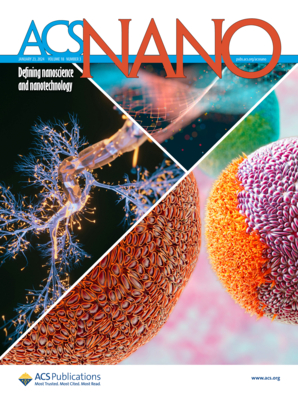Peroxidase-Inspired Polyphthalocyanine Networks with Highly Efficient Sonocatalytic Activities for On-Demand Tumor Immunotherapies in Breast Cancers.
IF 16
1区 材料科学
Q1 CHEMISTRY, MULTIDISCIPLINARY
引用次数: 0
Abstract
The rational design of sonocatalytic materials capable of on-demand modulating host innate and adaptive immune responses represents a critical advancement in tumor immunotherapy. Herein, inspired by the heme structures in peroxidase, we propose the de novo design of a ferrous polyphthalocyanine network (p-PcFe) with highly efficient sonocatalytic activities for on-demand tumor immunotherapies in breast cancers. The p-PcFe exhibits remarkable structural properties, including its large π-conjugated networks, electron-rich catalytic centers, and d-π delocalization effects, which enable excellent peroxidase-like activity and ultrasound conversion efficiency within the tumor microenvironment to catalytically generate reactive oxygen species (ROS). Our systematic studies demonstrate that p-PcFe can controllably generate abundant ROS to destroy primary tumor cells and facilitate the release of tumor-associated antigens, thereby inducing immunogenic cell death (ICD) and promoting the maturation and migration of antigen-presenting cells. Consequently, the ICD effect drives macrophage polarization, enhances infiltration of tumor-specific effector T cells, and stimulates the secretion of pro-inflammatory cytokines, culminating in robust antitumor immunity, which then establishes durable immune memory and effectively prevents tumor recurrence and lung metastasis. This study demonstrates that p-PcFe not only elicits a potent antitumor immune response but also fosters long-term immune memory for cancer immunotherapy, which offers a promising and on-demand strategy to engineer ROS-producing materials to overcome the immunosuppression and boost immunogenicity for converting "immune-cold" into "immune-hot" tumors.具有高效声催化活性的过氧化物酶激发的聚酞菁网络用于乳腺癌按需肿瘤免疫治疗。
合理设计能够按需调节宿主先天和适应性免疫反应的声催化材料是肿瘤免疫治疗的重要进展。在此,受过氧化物酶中血红素结构的启发,我们提出了一种具有高效声催化活性的聚酞菁亚铁网络(p-PcFe)的重新设计,用于乳腺癌的按需肿瘤免疫治疗。p-PcFe具有显著的结构特性,包括其大的π共轭网络、富含电子的催化中心和d-π离域效应,使其具有优异的过氧化物酶样活性和肿瘤微环境内的超声转化效率,从而催化生成活性氧(ROS)。我们的系统研究表明,p-PcFe可以可控地产生大量ROS,破坏原代肿瘤细胞,促进肿瘤相关抗原的释放,从而诱导免疫原性细胞死亡(ICD),促进抗原提呈细胞的成熟和迁移。因此,ICD效应驱动巨噬细胞极化,增强肿瘤特异性效应T细胞的浸润,刺激促炎细胞因子的分泌,最终产生强大的抗肿瘤免疫,从而建立持久的免疫记忆,有效地防止肿瘤复发和肺转移。该研究表明,p-PcFe不仅可以引发有效的抗肿瘤免疫反应,还可以促进癌症免疫治疗的长期免疫记忆,这为设计ros生成材料以克服免疫抑制并提高将“免疫冷”肿瘤转化为“免疫热”肿瘤的免疫原性提供了一种有前途的按需策略。
本文章由计算机程序翻译,如有差异,请以英文原文为准。
求助全文
约1分钟内获得全文
求助全文
来源期刊

ACS Nano
工程技术-材料科学:综合
CiteScore
26.00
自引率
4.10%
发文量
1627
审稿时长
1.7 months
期刊介绍:
ACS Nano, published monthly, serves as an international forum for comprehensive articles on nanoscience and nanotechnology research at the intersections of chemistry, biology, materials science, physics, and engineering. The journal fosters communication among scientists in these communities, facilitating collaboration, new research opportunities, and advancements through discoveries. ACS Nano covers synthesis, assembly, characterization, theory, and simulation of nanostructures, nanobiotechnology, nanofabrication, methods and tools for nanoscience and nanotechnology, and self- and directed-assembly. Alongside original research articles, it offers thorough reviews, perspectives on cutting-edge research, and discussions envisioning the future of nanoscience and nanotechnology.
 求助内容:
求助内容: 应助结果提醒方式:
应助结果提醒方式:


